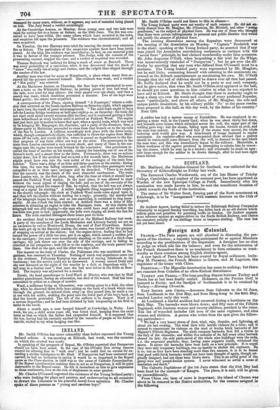IRELAND.
Mr. Smith O'Brien has more ostensibly than before espoused the Young Ireland schism. A tea-meeting at Kidrush, last week, was the occasion on which the avowal was made.
In speaking of the prospects of Repeal, Mr. O'Brien regretted that Dungarvan should not have been seized. In the case of the O'Conor Don strong reasons existed for allowing him to "walk over"; but he could find no excuse for ex- tending a similar indulgence to Mr. Shell. If Dungarvan had been contested and carried, he had no hesitation in saying it would be as important to the Repeal cause as the Clare election in 1828 was to the cause of Catholic Emancipation. If the Repeal constituencies continue thus to act as at Dungarvan, it will be quite destructive to the Repeal cause. He felt it incumbent on him to give expression to those sentiments, even at the risk of displeasure in some quarter. Mr. Charles O'Connell regretted the existence of the Young Ireland party; who were looking for place and pension, and endeavouring on all occasions to thwart the Liberator in his peaceful moral force agitation. Mr. Charles spoke of these persons as "young and careless boys."
Mr. Smith O'Brien could not listen to this in silence— The Young Ireland party were not worthy of such censure. He did not en.;- tirely dissent from Mr. Meagher, Mr. O'Gorman, Mr. Mitchell, and other " young tlemen," on the subject of physical force. He was one of those who thought that there were certain infringements in personal and public liberties that would not justify the absence of physical force.
The existing dissensions among the Repealers were denounced at the meeting of the Association on Monday. "Captain" Broderick was in the chair: speaking at the Young Ireland party, he asserted that if any man joined the Association entertaining sentiments at variance with the moral force" principle, he had claimed membership under false pretences. Mr. John Augustus O'Neill, when bespeaking a fair trial for the Whigs, was inconveniently reminded of " Dungarvan "; but he got over the dif- ficulty by asserting that any man who differed from O'Connell must be a madman. The Young Ireland party were represented by Mr. Meagher; but he said little; contenting himself with referring to the sentiments ex- pressed at the Kilrnsh entertainment as sanctioning his own. Mr. O'Neil' thought that the veil of oblivion should be drawn over all that had passed. Mr. Reilly declared that he could not be a party to any such compact; and he gave notice, that when Mr. Smith O'Brien next appeared in the hall, he should put some questions to him relative to what he was reported to have said at Kilrush. Mr. Steele thought that those in authority ought to keep a sharp eye over the words and conduct of every professed Repealer, more "particularly, and above all others, of Mr. Meagher, the sole and unique public dissentient, by his solitary public ' No ' to the peace resolu- tions proposed in this hall, on this day week, by the father of his country." Rent 1291.
A soldier has had a narrow escape at Enniskillen. He was employed in re- pairing a stone well, in the County Gaol; when he was about thirty feet down,. and beneath some beams which stretched across the well, the upper part of the' walling gave way; but the stones falling upon the beams, formed an arch, and the man was unhurt. It was feared that if the stones were moved, the whole- tottering arch would give way. A detachment of troops hastened to render assistance. An engineer-officer who accompanied them advised that a gallery should be commenced some distance from the well, to descend to the spot where the man was; and this was immediately begun by the military. Meanwhile, a fellow workman of the captive persisted in attempting to release him by remov- ing the stones, which he sent up in a bucket; and eventually he made an aper- ture large enough for the soldier to be drawn through, after he had been eight hours buried.


























 Previous page
Previous page